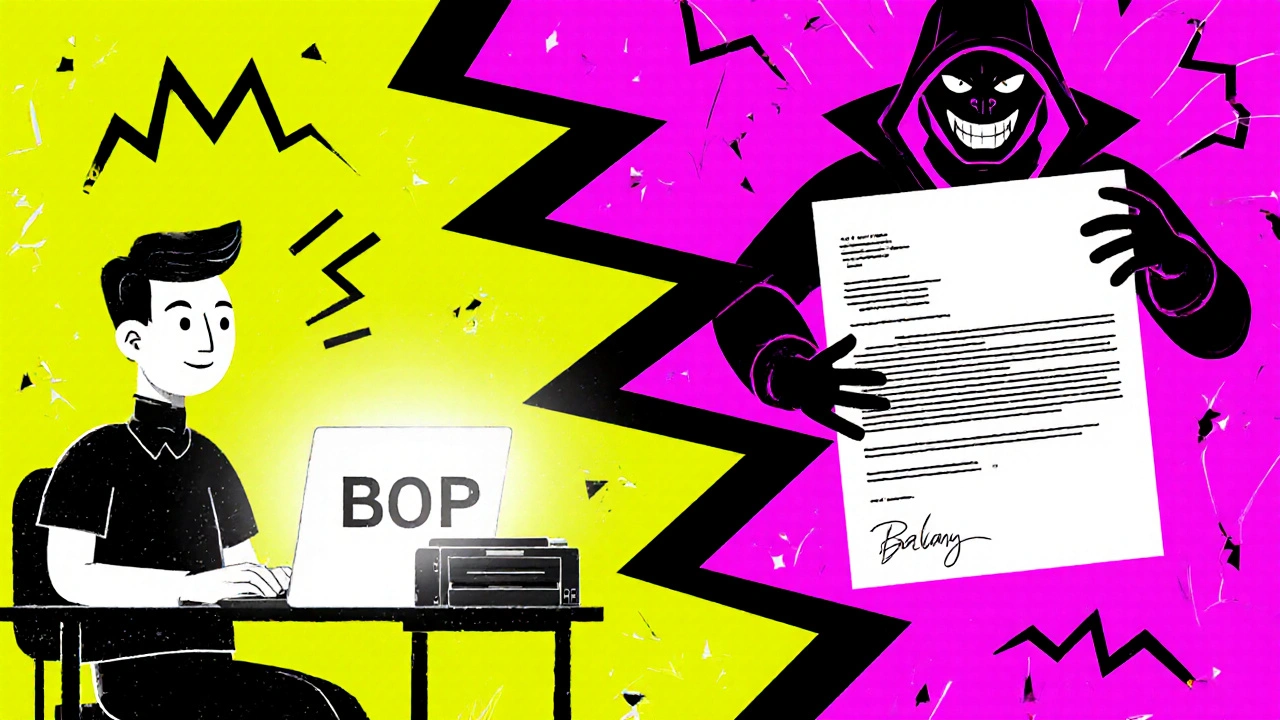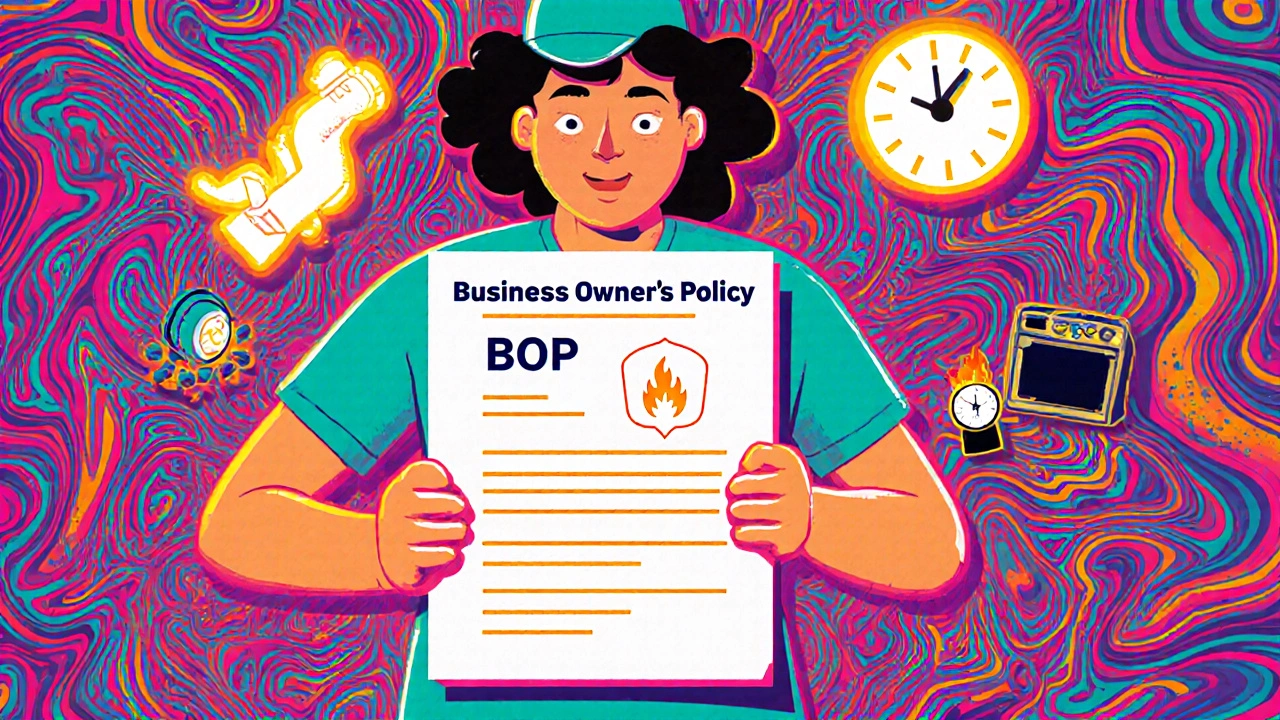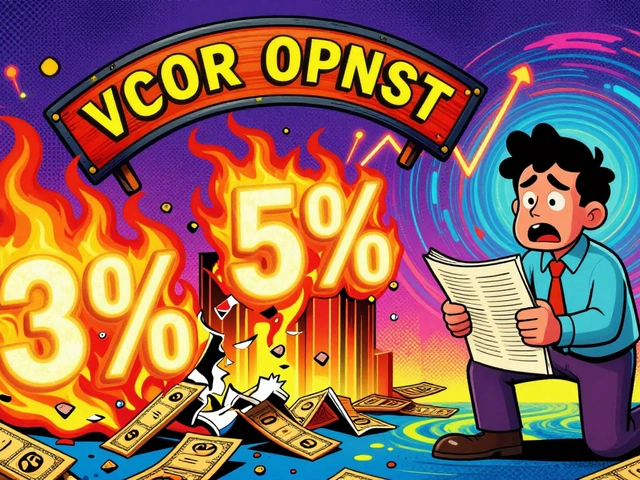BOP Coverage Gap Analyzer
Your Business Insurance Needs
Answer these questions to determine what coverage you need beyond a standard Business Owner's Policy (BOP).
Your Coverage Report
Based on your selections, here's what you need beyond a standard BOP:
Recommended Next Steps
Discuss these coverage gaps with your insurance agent. Many small businesses miss out on these critical protections.
Starting a small business is exciting. But if you don’t have the right insurance, one accident, fire, or lawsuit could wipe out everything you’ve built. That’s where a Business Owner’s Policy - or BOP - comes in. For most startups with a physical location, inventory, or customer foot traffic, a BOP isn’t just smart. It’s essential.
What Exactly Is a Business Owner’s Policy?
A Business Owner’s Policy (BOP) is a single insurance package that combines three core coverages most small businesses need: general liability, commercial property, and business interruption. Think of it like homeowners insurance - but for your business. Instead of buying three separate policies and juggling multiple bills, you get one policy, one deductible, and one renewal date.
According to the Insurance Information Institute, BOPs are designed for businesses with standard risk profiles - the kind that don’t need custom, enterprise-level coverage. That’s why they’re perfect for most startups: a coffee shop in Missoula, a local printer, a boutique retail store, or even a home-based consulting business.
Most BOPs include:
- General liability: Covers third-party injuries on your property, like a customer slipping on a wet floor, or damage to someone else’s property caused by your business operations.
- Commercial property: Protects your building, furniture, equipment, inventory, and even signage if they’re damaged by fire, wind, theft, or other covered events.
- Business interruption: Pays for lost income and ongoing expenses (like rent and payroll) if your business has to close temporarily due to a covered disaster.
That’s it. No more, no less - unless you add extras. And that’s where things get interesting.
What a BOP Doesn’t Cover (And Why It Matters)
Here’s the hard truth: a standard BOP leaves big gaps. If you assume it covers everything, you’re setting yourself up for a nasty surprise.
BOPs explicitly do not cover:
- Workers’ compensation
- Commercial auto insurance
- Professional liability (errors and omissions)
- Cyber liability
- Health or disability insurance
Let’s say you’re a startup offering graphic design services from your home. You don’t have a storefront, but you do have a laptop, a printer, and clients who pay you for custom work. One client sues you, claiming you copied their logo. That’s professional liability - not covered by your BOP. Or worse: a hacker steals your client database. That’s cyber liability - also not covered.
Or maybe you have one part-time employee who drives your van to deliver products. If they get into an accident, your BOP won’t touch it. You need commercial auto insurance - separate.
Startups often skip these add-ons because they think they’re too expensive. But the cost of a single lawsuit or data breach can be 10x what you’d pay for the extra coverage.
Who Really Needs a BOP?
Not every startup needs a BOP. If you’re a solopreneur running a blog or a digital agency with no physical assets, you might be better off with just general liability and cyber insurance.
But if your business has any of these, a BOP is a must:
- A physical location - even a rented office or retail space
- Inventory, equipment, or furniture you own
- Customers or clients who visit your premises
- A landlord or client who requires proof of insurance
For example, a bakery in downtown Missoula that sells pastries to walk-in customers needs a BOP. Their oven, mixers, and flour inventory are all covered. If someone trips on a loose tile and breaks their wrist, the liability part kicks in. If a fire damages the shop, business interruption pays rent and salaries while they rebuild.
On the flip side, a freelance web developer working from a coffee shop with no equipment or clients coming to their home? They probably don’t need property coverage. But they do need professional liability - and that’s not in a BOP.

Cost and Savings: Is a BOP Really Cheaper?
Yes. A BOP usually costs less than buying the same coverages separately. Insureon reports that bundling general liability and property insurance into a BOP can save small businesses 10-25% compared to buying them as standalone policies.
For most startups, a basic BOP runs between $500 and $1,500 per year. That’s less than $130 a month. Some home-based businesses pay as little as $300 a year.
But here’s what matters more than the price tag: what you’re protected against.
Let’s say your $1,200 BOP saves you from a $50,000 lawsuit after a customer slips and falls. That’s a 4,000% return on your investment. Or imagine your laptop and printer get stolen. If your BOP covers $10,000 in property loss, you just saved yourself from having to pay out of pocket.
What you’re really paying for isn’t just insurance - it’s peace of mind.
Customizing Your BOP: Add-Ons Startups Can’t Ignore
A BOP isn’t a one-size-fits-all. Most insurers let you add endorsements - small, affordable upgrades that plug critical gaps.
Here are the top three endorsements startups should consider:
- Cyber liability: Covers data breaches, ransomware, phishing attacks, and legal costs if customer data is stolen. For any startup handling emails, payment info, or client files - this is non-negotiable. Adds $200-$600/year.
- Professional liability (E&O): Protects you if a client claims your work was negligent or caused them financial harm. Essential for consultants, designers, developers, and service providers. Adds $300-$800/year.
- Equipment breakdown: Covers repair or replacement of essential machinery - like a commercial oven, HVAC system, or photocopier - if it suddenly fails. Adds $150-$400/year.
Don’t just accept the default BOP. Ask your agent: “What endorsements do most businesses like mine add?”

How to Get a BOP: The Startup’s Step-by-Step Guide
Getting a BOP is easier than you think. Here’s how to do it right:
- Know your risks: List your assets (equipment, inventory, location), your customer interactions, and your services. What could go wrong?
- Get quotes from at least three providers: Use online platforms like Insureon, Coterie, or The Hartford. They let you compare bundled policies side-by-side.
- Don’t skip the fine print: Read what’s excluded. If you’re unsure, ask: “Does this cover [specific risk]?”
- Add the right endorsements: Based on your business type, pick 1-2 add-ons that match your actual needs.
- Get your certificate of insurance: Landlords, clients, and event venues often require proof. Make sure your policy includes this document.
Most applications take under 15 minutes. You’ll need your business address, estimated annual revenue, and a list of your major assets. No lawyer required.
What Happens When You Don’t Have a BOP?
One real-world example: a startup in Bozeman launched a custom furniture business. They had a small workshop and a website. They thought they didn’t need insurance because they were “just starting out.”
Then, a customer tripped over a power cord in the workshop and broke their ankle. Medical bills totaled $28,000. The customer sued. The startup had no liability coverage. They had to pay out of pocket - and lost their savings, their equipment, and their business.
That’s not a hypothetical. It happens every day.
Insurance isn’t about expecting disaster. It’s about making sure you survive it.
Final Thought: BOPs Are the Foundation, Not the Whole House
A BOP is the bedrock of small business insurance. For most startups, it’s the smartest, most affordable way to protect your physical assets and your reputation.
But it’s not a magic shield. You still need to evaluate your unique risks. If you’re selling digital services, add cyber and professional liability. If you have employees, get workers’ comp. If you use a vehicle for business, get commercial auto.
Start with the BOP. Then build on it - step by step. That’s how you turn a risky startup into a resilient business.






Comments
Yo, if you're a startup and you're not thinking about cyber liability, you're basically leaving your front door wide open and posting ‘FREE STUFF’ on Reddit. I’ve seen so many small biz owners get wrecked by ransomware because they thought ‘we’re too small to be targeted.’ Nah, babe. You’re the low-hanging fruit. Add that endorsement. $500 a year to avoid a $50k nightmare? That’s not insurance-that’s a survival kit.
Let me be unequivocally clear: the notion that a BOP is ‘sufficient’ for any business with customer foot traffic is not merely negligent-it is criminally irresponsible. The exclusion of professional liability is not an oversight; it is a deliberate design flaw in the marketing narrative. A graphic designer, a consultant, a therapist operating from home-these are not ‘exceptions.’ They are the *majority* of modern startups. To suggest otherwise is to peddle insurance fairy tales. Your BOP covers your desk. It does not cover your mind. And your mind is your asset.
It is truly fascinating how we, as human beings, tend to treat insurance as an expense rather than an investment in continuity. When we speak of a BOP, we are not merely discussing contractual obligations or policy documents-we are speaking of the fragile ecosystem that allows creativity to survive in the face of chaos. A coffee shop may seem like a simple venture, yet beneath it lies the dreams of a parent, the livelihood of an employee, the memory of a community gathering place. To neglect cyber liability or professional indemnity is not frugality-it is a surrender to the unpredictable. Perhaps we must reframe our understanding: insurance is not the cost of doing business. It is the price of dignity.
Bro, I got a BOP last year for my home-based SaaS thing. Didn’t even need the property part since I got nothing but a laptop and a cat. But I added cyber and E&O-$400 total. Had a client sue me for ‘bad UX’ last month. Insurer paid $12k in legal fees. No drama. No bankruptcy. Just a notification email saying ‘claim approved.’ If you’re not doing this, you’re just gambling with your rent money. Don’t be that guy.
Wow. A whole essay on BOPs like this is some groundbreaking journalism. Congrats, you just explained what every insurance agent has been pushing since 2012. Next up: ‘Water is wet, and fire burns.’ Meanwhile, real entrepreneurs are out here bootstrapping with PayPal and duct tape, laughing at people who pay $1,500 a year to feel safe. You didn’t build a business-you built a risk management PowerPoint. Get a real job.